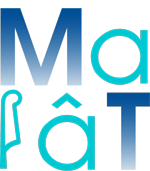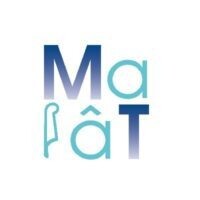Data show achievement of primary endpoint, demonstration of functional microbiota restoration, inflammation reduction and positive safety profile in acute myeloid leukemia patients.
San Diego, California, December 1, 2018 – MaaT Pharma announced today the results from its ODYSSEE (NCT02928523) Phase 1b/2a clinical trial demonstrating that the Company’s proprietary MaaT Microbiome Restoration Biotherapeutic (MMRB) therapeutic is able to restore a functional microbiome in acute myeloid leukemia (AML) patients after having undergone intensive chemotherapy and multiple courses of antibiotics. The study was designed to investigate the safety and feasibility of reestablishing a functional microbiome using MaaT Pharma’s therapeutic as well as evaluating initial signs of efficacy including reduction of intestinal inflammation and the control of detrimental antibiotic-resistant bacteria. Due to the harsh treatment regimens, AML patients lose their functional microbiome and experience a variety of severe complications that dramatically impact outcomes and quality of life. MaaT Pharma’s MMRB therapeutic aims to restore microbiome function and improve clinical outcomes in these patients. The data were presented at 6:15 pm Pacific Time on December 1st, 2018 at the 60th American Society of Hematology (ASH) Annual Meeting and Exposition held in San Diego, California.
In total 25 AML patients were treated in the clinical trial. At the time of admission, fecal microbiota was collected from each patient, conditioned, processed and frozen according to GMP conditions. Following the first round of chemotherapy and antibiotic treatment, patients were administered two doses of the collected fecal microbiota as an enema 24 hours apart after hematopoietic recovery and before undergoing the second round of chemotherapy. Blood and fecal samples were collected on three separate days, (1) on day 0, at the time of patient inclusion in the trial, (2) on day 29, following hematopoietic recovery after the first round of intensive treatments and (3) on day 40, before the start of the consolidation chemotherapy. Microbiome profile evolution was analyzed using high-resolution metagenome sequencing and patient follow-up was scheduled for 6 months and 12 months after inclusion.
”The results from the ODYSSEE clinical trial are impressive and demonstrate proof-of-concept for the ability of our approach to restore a functional microbiome, following antibiotics and chemotherapies, in AML patients and that reestablishing the microbiome has the potential to improve survival outcomes
commented Professor Mohamad MohtyMD, PhD, Professor of Hematology at Sorbonne University and Head of the Hematology and Cellular Therapy Department at the Saint Antoine Hospital in Paris
”Acute myeloid leukemia patients have limited treatment options and the intensive chemotherapy and antibiotic therapy regimens they have to endure significantly contribute to poor quality of life and low survival outcomes. Given these positive results, we look forward to our planned randomized trial with the off-the-shelf capsule formulation MaaT033, as the next step.
commented Professor Mohamad MohtyMD, PhD, Professor of Hematology at Sorbonne University and Head of the Hematology and Cellular Therapy Department at the Saint Antoine Hospital in Paris
Overall, reintroduction of the patient’s own gut microbiome through MaaT Pharma’s proprietary process was well tolerated and no severe adverse events were reported. Metagenomic analysis of the patient samples collected on days 0, 29 and 40 using MaaT Pharma’s proprietary big data analysis platform, GutPrint® showed that the MMRB therapeutic restored significantly greater than 90% of the microbial species diversity and structure at day 40, ten days after treatment, including a 43% reduction of the overall expression of antibiotic resistance genes. Most importantly, gut inflammation was significantly reduced to near-baseline levels following MMRB treatment as measured by fecal neopterin biomarker. These results also correlated with the significant reduction of pro-inflammatory bacterial families and restoration of beneficial species among the Lachnospiraceae and Ruminococcaceae families.
”Our commitment has always been to improve outcomes in patients with life-threatening diseases. The results and experience from this trial support our investment in developing standardized, reproducible and high diversity microbiome biotherapeutic products using our MMRB therapeutic and cGMP production facility to treat patients with blood cancers and the complications arising from its treatment.
added Hervé AffagardCo-founder and CEO of MaaT Pharma
Our lead product, MaaT013, which is manufactured from pooled donors, was developed based on the positive data we collected from this trial and the scientific and clinical evidence showing that restoring the microbiome has therapeutic potential. MaaT013 is currently being tested in a Phase 2 clinical study to treat acute graft-versus-host-disease, a severe consequence of stem cell transplantation. We are also very pleased to have just been awarded Orphan Drug Designation by the EMA for this product after already receiving the designation by the FDA earlier this year.
The poster is available on the company website under “News” or by accessing here.
About MaaT Pharma
MaaT Pharma, a clinical stage company, has established the most complete approach to restoring patient-microbiome symbiosis to improve survival outcomes in life-threatening diseases. Committed to treating blood cancers and graft-versus-host disease, a serious complication of allogeneic stem cell transplantation. Supporting the further expansion of our pipeline into larger indications, we have built a powerful discovery and analysis platform to evaluate drug candidates, determine novel disease targets and identify biomarkers for microbiome-related conditions. Our therapeutics are produced through a standardized cGMP manufacturing and quality control process to safely deliver the full diversity of the microbiome. MaaT Pharma benefits from the commitment of world-leading scientists and established relationships with regulators to spear-head microbiome treatment integration into clinical practice.


